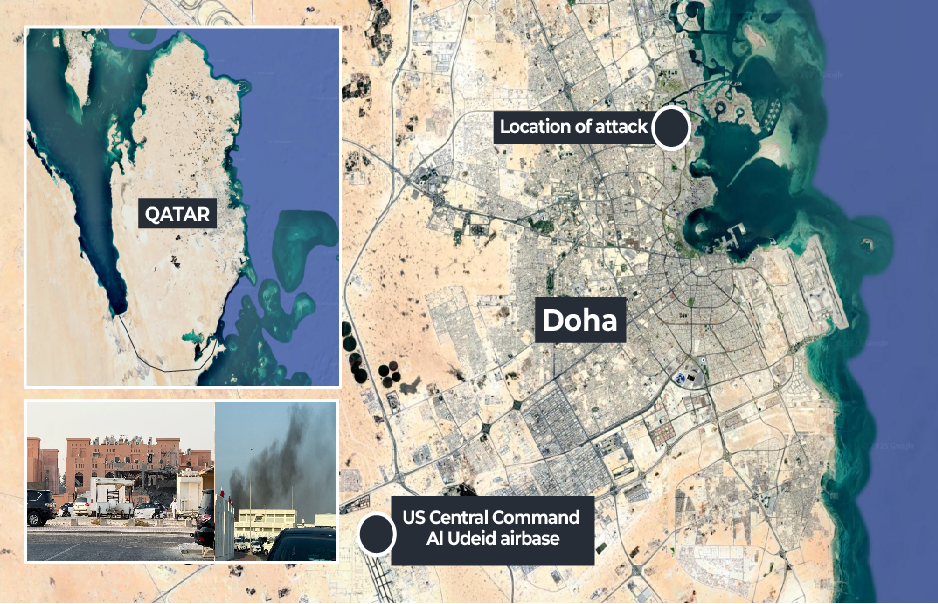
- Israel launched airstrikes in Doha targeting Hamas leaders, including chief negotiator Khalil al Hayya, killing five people but failing to eliminate top leaders amid ongoing US-led ceasefire talks.
- The strike drew condemnation from Australia, New Zealand, Malaysia, Pakistan, and India, while the US expressed concerns about its impact on regional stability and relations with Qatar.
- The conflict stems from historical territorial, religious, and humanitarian disputes, with the US backing Israel and Iran supporting Hamas.
- The attack disrupted peace negotiations, violated Qatar’s sovereignty, and risked further destabilising the region while complicating diplomatic efforts.
Israel launched strikes in Doha targeting the Hamas leader, fuelling tensions amid the US’s effort to negotiate a ceasefire in Gaza. According to Israeli media reports, the operation deployed 15 fighter jets, which launched 10 munitions at a single target. In the official statement, Israel stated that five people were killed, but the senior leaders of Hamas survived.
Reports indicate that the strike targeted Hamas’s top leaders, including Khalil al Hayya, the exiled Hamas leader and the chief negotiator. Al Hayya has been involved with Hamas since its founding in 1987 and has played a key role in diplomacy, mostly operating from Qatar.
Roots of the Israel–Hamas Conflict
The conflict between Israel and Hamas is rooted in history, politics and territory. Hamas, an Islamist Palestinian organisation, has controlled the Gaza Strip since 2007, following its electoral victory and the removal of rival factions. The conflict, which includes tensions between Israel and Hamas, dates back to the 19th and early 20th centuries when the Zionist movement pushed for a Jewish homeland. The creation of Israel in 1948, along with the wars against neighbouring Arab countries, caused many Palestinians to lose their homes, leaving a legacy of deep hostility.
The present-day hostilities stem from multiple overlapping factors. Hamas rejects Israeli control over Palestinian territories such as Gaza and the West Bank, fueling territorial tensions. Jerusalem’s deep religious significance for Muslims and Christians makes it a focal point of conflict, with Hamas framing its actions as part of an Islamic struggle against Israeli attacks. The humanitarian crisis in Gaza, worsened by blockades from Israel and Egypt that severely restrict the movement of people and goods, has added to the volatility of the situation, further enabling the involvement of Hamas and its entities.
Beyond the regional dynamics, geopolitical interests have also impacted the conflict. The strong support of the US to Israel and Iran’s backing of Hamas have shaped the conflict over the decades.
Leaders from various Asia-Pacific countries have strongly condemned Israel’s attack on Doha. Australian Foreign Minister Penny Wong described the attack as a wrong cause of action. New Zealand’s Foreign Minister also called for an end to the violence. The other countries, like Malaysia and Pakistan, also condemned the strike outright, while India expressed its concern and called for restraint.
Israel’s Strike Risks US-Gulf Relations
After the attack, the Israeli Prime Minister stated that the attack was entirely Israel’s decision. The US said that it was made aware of the operation due to the presence of the large American airbase located in Qatar. Later, Trump also clarified that the strike was not his intention and also expressed regret, saying that Qatar is a close ally and such an attack should not happen again. This also raised concerns about how it might affect US relations with Qatar and other Gulf countries.
A few media outlets have claimed that Hamas leaders were in Qatar to assist with peace negotiations, as they were supposedly considering the US proposal for a ceasefire. The proposal included freeing hostages and negotiating a long-term peace deal with Israel.
Regional Instability Acerbates
The attack on Hamas leaders has heightened the tensions and made ongoing peace efforts more difficult. Although Israel has defended its strike as a security action, it has faced strong criticism for disrupting ceasefire negotiations and violating Qatar’s sovereignty. The incident could further destabilise the region and strain ties between key international players. Rebuilding trust, diplomatic engagement and prioritising humanitarian support are some major steps to prevent further escalation and to work toward lasting peace.
References:
- https://www.bbc.com/news/articles/cm2zepgp5neo
- https://www.hindustantimes.com/world-news/israel-targets-hamas-leaders-in-doha-as-gaza-war-worsens-what-we-know-so-far-101757481877900.html
- https://www.nytimes.com/2025/09/09/world/middleeast/israel-hamas-doha-qatar-strike.html
Anshu Mishra holds a bachelor’s degree in History from Kolkata University and is currently preparing for the UPSC Civil Services Examination. Her interests include geopolitics, climate change, and national security. Views expressed are the author’s own.
